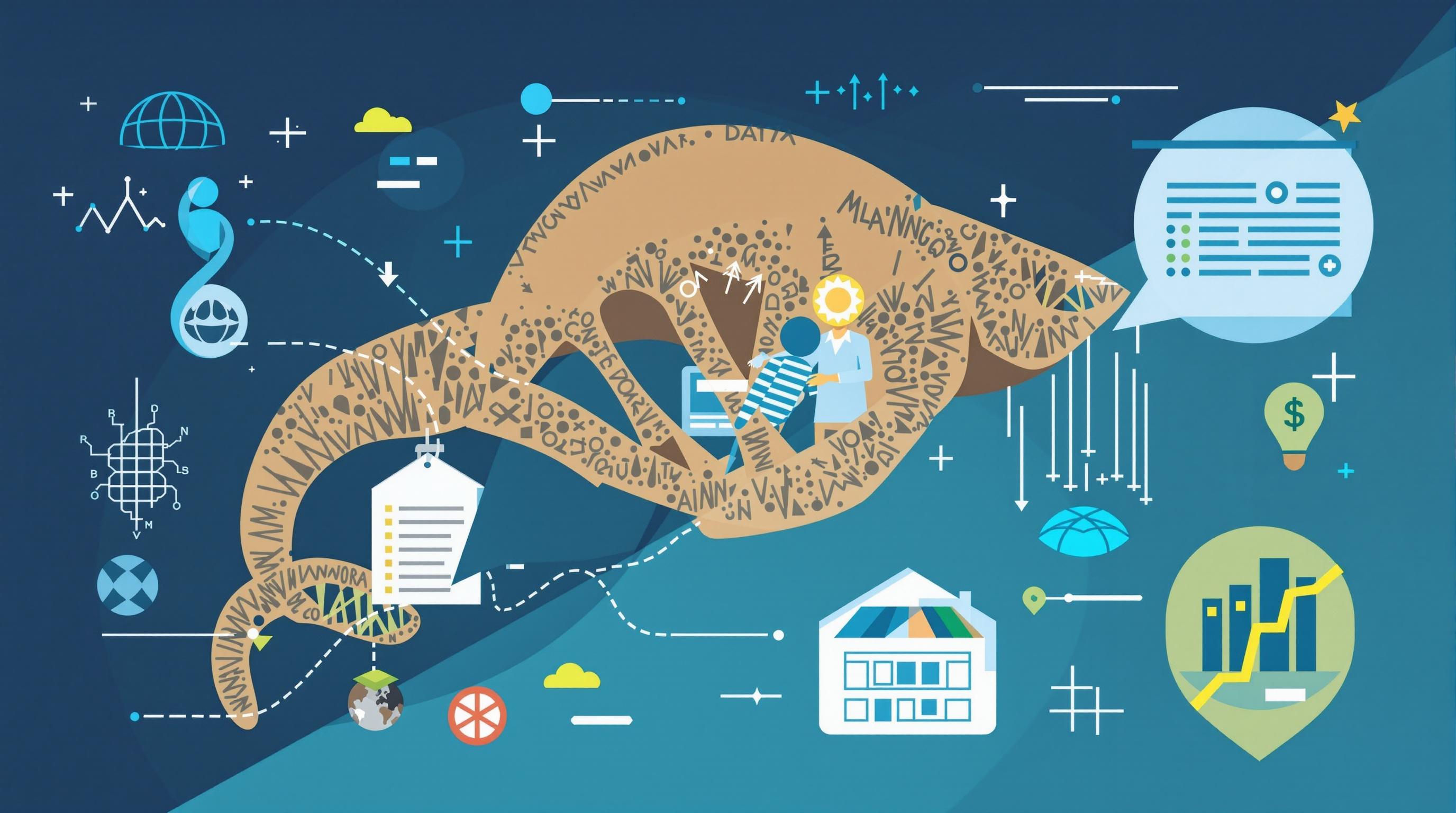Featured Articles
- "Conversational AI: The New Frontier in Workplace Culture or Just Another Buzzword?"
- Exploring Bioinformatics in Corporate Strategy: The Hidden Link Between Genetic Data and Market Innovation
- Navigating the Shadows: The Rise of Dark Patterns in Business Technology and User Experience
- The Quirky Rise of 'Techno-Optimism': How Businesses Embrace AI Dystopia for Profit
- The Untapped Potential of Mythical Creatures in Business Tech: Surreal Strategies for Modern Enterprises
Exploring Bioinformatics in Corporate Strategy: The Hidden Link Between Genetic Data and Market Innovation
Exploring Bioinformatics in Corporate Strategy: The Hidden Link Between Genetic Data and Market Innovation
Bioinformatics isn't just a niche of molecular biology anymore; it’s a cornerstone of corporate strategy that fuels groundbreaking innovations and revolutionizes market dynamics. This article dives into how companies harness genetic data to reshape industries, drive competitive advantage, and unlock unprecedented growth.
The Genetic Goldmine: Why Data Drives Innovation
Imagine a treasure trove of information so vast that it can predict not only health outcomes but also consumer behavior and product success. Welcome to the world of bioinformatics, where genetic data sets provide companies with insights that go far beyond traditional market research. According to a 2023 report by Deloitte, firms investing in genomics and bioinformatics technologies have seen a 35% faster rate of innovation in product development cycles compared to peers.
Case Study: 23andMe and Market Disruption
23andMe famously began as a consumer genetics testing company but quickly expanded its business model by leveraging its vast genetic database for pharmaceutical research partnerships. By integrating bioinformatics into their corporate strategy, they not only democratized access to genetic information but also created a lucrative B2B research arm that accelerates drug discovery and validation. Their IPO in 2021 was a testament to how deeply genetic data can underpin market innovation.
But to understand the hidden link between bioinformatics and corporate strategy, it’s crucial to appreciate how data from genes can translate into marketable insights. Genetic sequences do not exist in a vacuum; when combined with AI and predictive analytics, they become powerful tools to tailor products — from personalized medicine to nutrition plans and wellness apps.
From Soup to Software: A Personal Take on Bioinformatics
As a 42-year-old technology enthusiast who has transitioned from biotech labs to corporate boardrooms, I’ve witnessed firsthand the transformation bioinformatics brings. It’s like having a crystal ball — turning raw, complex genetic code into actionable business intelligence. The intersection of life sciences and business strategies has shifted from abstract theory to practical application, fundamentally changing how companies allocate resources and innovate.
Why Corporate Strategists Can’t Afford to Ignore Bioinformatics
The traditional corporate approach often siloed R&D departments away from marketing and sales. However, with genetic data becoming a market differentiator, strategic leaders are breaking down these walls. McKinsey’s 2022 report highlights bioinformatics as one of the top three emerging drivers of disruption across healthcare, cosmetics, and agriculture sectors, signaling a pivotal shift in how companies pursue competitive advantage.
Here’s a fun fact: Companies utilizing genetic insights to optimize product formulations have reduced time-to-market by an average of six months, leading to cost savings upwards of 20%. How? By pinpointing consumer needs at the molecular level, firms sidestep guesswork and launch precisely targeted offerings.
Humor Break: When DNA Meets Sales Pitches
Imagine a sales rep pitching a shampoo by saying, "Our formula is backed by your grandmother’s genome." Sounds bizarre? Yet, in some boutique beauty companies, customer genetic markers influence product variants, making that quirky pitch more credible than ever before. Bioinformatics has added a new layer of personalization that even marketing teams have had to learn — no more generic “one-size-fits-all” slogans!
Precision Agriculture: Bioinformatics Cultivating Market Growth
It’s not just health and beauty; agriculture is embracing bioinformatics to boost crop yields and sustainability. Monsanto’s (now Bayer) use of genetic data to engineer drought-resistant seeds showcases how bioinformatics underpins strategic product development in agro-tech. This approach doesn’t just improve harvests; it reshapes market competition and influences global food supply chains.
Scrutinizing your competitor’s genetic data might seem unethical or unfeasible, yet companies often license anonymized genomic databases, gaining aggregated, multi-population insights that reflect emerging trends. This data-driven strategy informs everything from new product lines to global expansion tactics.
How AI Amplifies Bioinformatics in Corporate Strategies
Artificial Intelligence meshes perfectly with bioinformatics, deciphering complex genetic datasets at speed and scale impossible for humans alone. Big pharma’s use of AI to analyze patient genomics has cut the average drug development timeline by 25%, generating billions in value and drastically improving patient outcomes.
The Ethical Tightrope
Of course, integrating genetic data into corporate strategies walks a fine line around privacy and ethics. Responsible corporations are developing transparent policies and securing consent frameworks to uphold trust. According to the 2023 Global Bioethics Survey, 78% of consumers expressed greater trust in brands with clear genetic data usage guidelines — a clear signal for companies to prioritize ethics as they innovate.
One cannot underestimate the cultural shift bioinformatics induces within corporate structures. It encourages multidisciplinary collaboration, blending data scientists, geneticists, marketers, and strategists in a melting pot of creativity and scientific rigor.
Looking Ahead: Bioinformatics as a Competitive Differentiator
Now, think about the future: will companies that ignore bioinformatics fall behind in the innovation race? Most likely, yes. Forward-looking corporations are investing heavily in bioinformatics capabilities, building proprietary datasets, and nurturing in-house expertise to capitalize on this untapped strategic resource.
In short, bioinformatics is rewriting the rules of corporate innovation through the lenses of genetic data, predictive analytics, and consumer personalization. It’s a dynamic, evolving landscape that will redefine how businesses compete, collaborate, and create value in the years to come.




